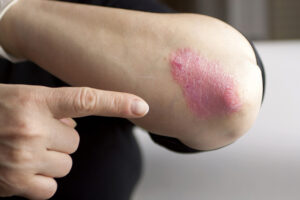
Best Ayurvedic Treatment for Psoriasis
Best Ayurvedic Treatment for Psoriasis: Psoriasis is a skin condition characterized by inflammation, prompting the accelerated growth of skin cells and the development of thick, scaly plaques. According to Ayurveda, an ancient system of medicine, psoriasis arises from an imbalance in two vital energy areas known as “doshas” – namely, “Vata” and “Kapha.” Vata governs bodily functions and may contribute to the dryness and scaling of the skin in psoriasis. On the other hand, Kapha, responsible for growth, is implicated in the itching and rapid turnover of skin cells associated with the condition.
The disharmony between these two energies results in the accumulation of toxins, leading to inflammation within the individual. Consequently, Ayurvedic treatments encompass not only herbal applications and medications but also extend to dietary and lifestyle recommendations.
Signs & Symptoms Of Psoriasis
Psoriasis usually manifests as red or pink patches of thickened, elevated, and dry skin. It typically impacts regions such as the elbows, knees, and scalp, although virtually any part of the body can be affected. The condition is often more prevalent in areas subject to trauma, repetitive rubbing, usage, or abrasions. Psoriasis can present in various forms, ranging from small flattened bumps and large, thick plaques of elevated skin to red patches, mildly dry pink skin, and even substantial flakes of dry skin that peel away.
The prevalent symptoms of psoriasis encompass:
- Red, elevated, inflamed patches of skin.
- Whitish-silver scales or plaques overlaying the red patches.
- Dry skin that may crack and bleed.
- Soreness surrounding the patches.
- Itching and burning sensations in the affected areas.
- Thick, pitted nails.
- Painful, swollen joints.

Best Ayurvedic Treatment for Psoriasis
Effects on Daily Life
Severe cases of psoriasis have been demonstrated to impact the quality of life-related to health similarly to other chronic conditions like depression, hypertension, congestive heart failure, or type-2 diabetes. Depending on the severity and location of outbreaks, individuals may endure considerable physical discomfort and some level of disability. Itching and pain can disrupt basic functions such as self-care, walking, and sleep.
Psoriasis plaques on the hands and feet may hinder individuals from engaging in specific occupations, participating in certain sports, and fulfilling family or household responsibilities. Scalp plaques can be particularly distressing, as the flaky buildup in the hair can be mistaken for dandruff. Seeking medical care can be both costly and time-consuming, potentially interfering with employment or school commitments.
Those with psoriasis may also grapple with self-consciousness about their appearance, leading to a diminished self-image rooted in fears of public rejection and psychosexual concerns. The resulting psychological distress can contribute to significant depression and social isolation.
The Ayurvedic Treatment At Pathyam Ayurveda
According to Ayurveda, the origin of the disease lies in impurities in the blood associated with emotional factors. Psoriasis is thought to arise from the imbalance of all three doshas (Vata, Pitta, Kapha), with a predominant influence of Vata and Kapha, as per Ayurvedic principles.
Ayurvedic texts describe skin diseases such as Ekakusta, kitibha, and Sidma, which closely mirror the classical symptoms of Psoriasis, reinforcing the Ayurvedic perspective. Ayurveda offers healing through medications, treatments, and supportive practices for this condition. If you are experiencing any of these symptoms, it is crucial to consult with a doctor. Schedule an appointment with the leading Ayurveda doctor for psoriasis at Pathyam Ayurveda and Panchakarma Centre in Delhi NCR. Dr. Karan Kataria highlights the promising results of Ayurvedic treatments in improving this skin condition.
Also Read:
FAQ: Best Ayurvedic Treatment for Psoriasis
1. What is the best Ayurvedic treatment for psoriasis?
Ayurvedic treatments for psoriasis may vary, but commonly include a combination of herbal medications, dietary recommendations, and lifestyle changes. Consultation with an experienced Ayurvedic practitioner can help determine the most effective treatment plan based on individual factors.
2. How long does it take to see results with Ayurvedic treatment for psoriasis?
The duration to witness improvements in psoriasis symptoms through Ayurvedic treatment can vary from person to person. It depends on factors such as the severity of the condition, adherence to prescribed remedies, and overall health. Typically, patients may start noticing positive changes within a few weeks to months.
3. Are Ayurvedic treatments for psoriasis safe and free from side effects?
Ayurvedic treatments are generally considered safe when administered by qualified practitioners. However, individual reactions can vary. It’s crucial to inform your Ayurvedic doctor about any allergies or sensitivities to ensure a personalized and safe treatment plan. Side effects are minimal when compared to conventional treatments, but monitoring is essential.
4. Can Ayurveda cure psoriasis permanently?
While Ayurvedic treatments can effectively manage and alleviate psoriasis symptoms, claiming a permanent cure may be challenging. Psoriasis is a chronic condition, and ongoing management is often required. Ayurveda addresses the root causes and enhances overall well-being, contributing to long-term relief.
5. Do Ayurvedic treatments for psoriasis involve dietary changes?
Yes, Ayurvedic treatments for psoriasis often include dietary modifications tailored to balance doshas and alleviate symptoms. This may involve recommendations for specific foods to include or avoid. Dietary changes are considered integral to holistic healing in Ayurveda and play a significant role in managing psoriasis.
Also Read:
Panchakarma: All you need to know about this Ayurvedic treatment






